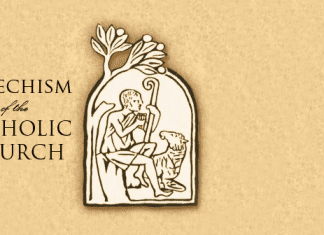Catechism of The Catholic Church #1808
1808 Fortitude is the moral virtue that ensures firmness in difficulties and constancy in the pursuit of the good. It strengthens the resolve to resist temptations and to overcome obstacles in the moral life. the virtue of fortitude enables one to conquer fear, even fear of death, and to face trials and persecutions. It disposes one even to renounce and sacrifice his life in defense of a just cause. "The Lord is my strength and my song." "In the world you have tribulation; but be of good cheer, I have overcome the world."
Catechism of The Catholic Church #1421
1421 The Lord Jesus Christ, physician of our souls and bodies, who forgave the sins of the paralytic and restored him to bodily health, has willed that his Church continue, in the power of the Holy Spirit, his work of healing and salvation, even among her own members. This is the purpose of the two sacraments of healing: the sacrament of Penance and the sacrament of Anointing of the Sick.
Catechism of The Catholic Church #1459
1459 Many sins wrong our neighbor. One must do what is possible in order to repair the harm (e.g., return stolen goods, restore the reputation of someone slandered, pay compensation for injuries). Simple justice requires as much. But sin also injures and weakens the sinner himself, as well as his relationships with God and neighbor. Absolution takes away sin, but it does not remedy all the disorders sin has caused. Raised up from sin, the sinner must still recover his full spiritual health by doing something more to make amends for the sin: he must "make satisfaction for" or "expiate" his sins. This satisfaction is also called "penance."
Catechism of The Catholic Church #2490
2490 The secret of the sacrament of reconciliation is sacred, and cannot be violated under any pretext. "The sacramental seal is inviolable; therefore, it is a crime for a confessor in any way to betray a penitent by word or in any other manner or for any reason."
Catechism of The Catholic Church #2639
2639 Praise is the form of prayer which recognizes most immediately that God is God. It lauds God for his own sake and gives him glory, quite beyond what he does, but simply because HE IS. It shares in the blessed happiness of the pure of heart who love God in faith before seeing him in glory. By praise, the Spirit is joined to our spirits to bear witness that we are children of God, testifying to the only Son in whom we are adopted and by whom we glorify the Father. Praise embraces the other forms of prayer and carries them toward him who is its source and goal: the "one God, the Father, from whom are all things and for whom we exist."
Catechism of The Catholic Church #2526
2526 So called moral permissiveness rests on an erroneous conception of human freedom; the necessary precondition for the development of true freedom is to let oneself be educated in the moral law. Those in charge of education can reasonably be expected to give young people instruction respectful of the truth, the qualities of the heart, and the moral and spiritual dignity of man.
Catechism of The Catholic Church #2793
2793 The baptized cannot pray to "our" Father without bringing before him all those for whom he gave his beloved Son. God's love has no bounds, neither should our prayer. Praying "our" Father opens to us the dimensions of his love revealed in Christ: praying with and for all who do not yet know him, so that Christ may "gather into one the children of God." God's care for all men and for the whole of creation has inspired all the great practitioners of prayer; it should extend our prayer to the full breadth of love whenever we dare to say "our" Father.
Catechism of The Catholic Church #2303
2303 Deliberate hatred is contrary to charity. Hatred of the neighbor is a sin when one deliberately wishes him evil. Hatred of the neighbor is a grave sin when one deliberately desires him grave harm. "But I say to you, Love your enemies and pray for those who persecute you, so that you may be sons of your Father who is in heaven."
Catechism of The Catholic Church #970
970 "Mary's function as mother of men in no way obscures or diminishes this unique mediation of Christ, but rather shows its power. But the Blessed Virgin's salutary influence on men . . . flows forth from the superabundance of the merits of Christ, rests on his mediation, depends entirely on it, and draws all its power from it." "No creature could ever be counted along with the Incarnate Word and Redeemer; but just as the priesthood of Christ is shared in various ways both by his ministers and the faithful, and as the one goodness of God is radiated in different ways among his creatures, so also the unique mediation of the Redeemer does not exclude but rather gives rise to a manifold cooperation which is but a sharing in this one source."
Catechism of The Catholic Church #1115
1115 Jesus' words and actions during his hidden life and public ministry were already salvific, for they anticipated the power of his Paschal mystery. They announced and prepared what he was going to give the Church when all was accomplished. the mysteries of Christ's life are the foundations of what he would henceforth dispense in the sacraments, through the ministers of his Church, for "what was visible in our Savior has passed over into his mysteries."














